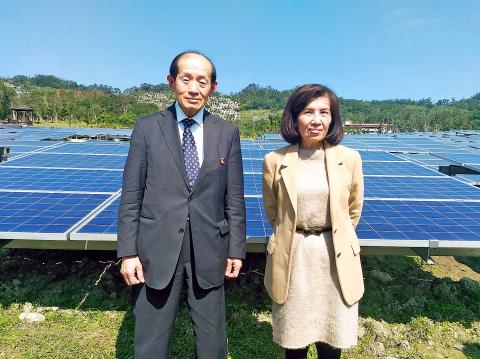Former Tatung Co (大同集團) chairman Lin Wei-shan (林蔚山) will have to serve eight years in prison for embezzlement and incurring company debt of NT$1.7 billion (US$53.8 million at the current exchange rate) after the Supreme Court on Wednesday rejected his appeal of a lower-court ruling.
After the Supreme Court announcement, Lin on Wednesday night issued a statement that said the ruling came as disappointing news and that he cannot accept the decision.
Along with the prison sentence, Lin also has to pay a fine of NT$300 million and was ordered to return NT$1.35 billion in illegal gains to the company.

Photo: Lee Ching-hui, Taipei Times
It was the final ruling on the case.
Lin, 73, was found guilty of embezzling corporate funds and for aggravated breach of trust under the Securities Exchange Act (證券交易法) and handed an eight-year prison sentence at a trial in August 2017.
Tatung Co has been the most famous Taiwanese household appliance brand for more than a century.
It was founded in 1918 and millions of Taiwanese have grown up using Tatung rice cookers, televisions, electric fans and other products known for their durability and reliability.
The firm also exported to other Asian and global markets.
Investigators found that when Lin was general manager of Tatung Co in 2000, he funneled money into Nature Worldwide Technology Corp (通達國際公司), a company headed by a female acquaintance, Chou Yun-nan (周雲楠), that produced personal computers, Unix portable servers and workstations.
When Chou ran into difficulties and her firm became debt-ridden, Lin made a personal investment in the company using NT$180 million from Tatung subsidiary Shan Chih Asset Development Co (尚志資產開發).
In 2007, Lin instructed another Tatung subsidiary, Shan Chih International Holding Co (尚志投資), to acquire Nature Worldwide Technology through an illegal buy-out to save the company from going bankrupt.
Tatung incurred debt of NT$1.7 billion due to Lin’s actions because its subsidiary was obliged to pay the debts owed by Nature Worldwide Technology after it acquired it in 2007.
The investigation found that Lin also served as the guarantor for NT$1.9 billion of bank loans taken out by Chou’s company to help clear its debts.
After the acquisition, Nature Worldwide Technology was dissolved in 2010.
The accusations of illegal asset transfers and financial irregularities prompted the Securities and Futures Investors Protection Center to file a class-action lawsuit against Lin.
The litigation charged Lin with breach of trust, violating the duties of his office as chairman of Tatung Co, while Chou was indicted.
In the first ruling, the New Taipei City District Court in June 2012 found both defendants guilty and sentenced them to four years and six months in prison for misappropriating company assets and creating fake transactions that resulted in losses to investors.
The Taiwan High Court in a second ruling handed Lin an eight-year prison sentence, along with a fine of NT$300 million in August 2014.
Additional reporter by CNA

NATIONAL SECURITY THREAT: An official said that Guan Guan’s comments had gone beyond the threshold of free speech, as she advocated for the destruction of the ROC China-born media influencer Guan Guan’s (關關) residency permit has been revoked for repeatedly posting pro-China content that threatens national security, the National Immigration Agency said yesterday. Guan Guan has said many controversial things in her videos posted to Douyin (抖音), including “the red flag will soon be painted all over Taiwan” and “Taiwan is an inseparable part of China,” while expressing hope for expedited “reunification.” The agency received multiple reports alleging that Guan Guan had advocated for armed reunification last year. After investigating, the agency last month issued a notice requiring her to appear and account for her actions. Guan Guan appeared as required,

A strong cold air mass is expected to arrive tonight, bringing a change in weather and a drop in temperature, the Central Weather Administration (CWA) said. The coldest time would be early on Thursday morning, with temperatures in some areas dipping as low as 8°C, it said. Daytime highs yesterday were 22°C to 24°C in northern and eastern Taiwan, and about 25°C to 28°C in the central and southern regions, it said. However, nighttime lows would dip to about 15°C to 16°C in central and northern Taiwan as well as the northeast, and 17°C to 19°C elsewhere, it said. Tropical Storm Nokaen, currently

‘NATO-PLUS’: ‘Our strategic partners in the Indo-Pacific are facing increasing aggression by the Chinese Communist Party,’ US Representative Rob Wittman said The US House of Representatives on Monday released its version of the Consolidated Appropriations Act, which includes US$1.15 billion to support security cooperation with Taiwan. The omnibus act, covering US$1.2 trillion of spending, allocates US$1 billion for the Taiwan Security Cooperation Initiative, as well as US$150 million for the replacement of defense articles and reimbursement of defense services provided to Taiwan. The fund allocations were based on the US National Defense Authorization Act for fiscal 2026 that was passed by the US Congress last month and authorized up to US$1 billion to the US Defense Security Cooperation Agency in support of the

PAPERS, PLEASE: The gang exploited the high value of the passports, selling them at inflated prices to Chinese buyers, who would treat them as ‘invisibility cloaks’ The Yilan District Court has handed four members of a syndicate prison terms ranging from one year and two months to two years and two months for their involvement in a scheme to purchase Taiwanese passports and resell them abroad at a massive markup. A Chinese human smuggling syndicate purchased Taiwanese passports through local criminal networks, exploiting the passports’ visa-free travel privileges to turn a profit of more than 20 times the original price, the court said. Such criminal organizations enable people to impersonate Taiwanese when entering and exiting Taiwan and other countries, undermining social order and the credibility of the nation’s